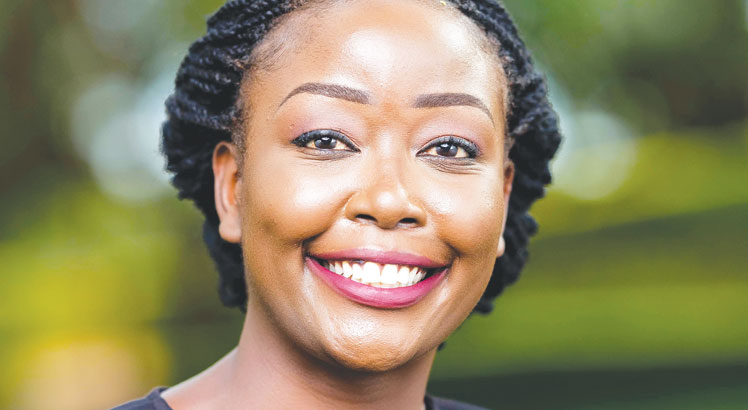Tisungane thompson: founder of akhada baskets
In an era where young graduates from tertiary institutions are struggling to secure employment, Tisungane Thompson is among the few creating job opportunities to many for a better life.
The young woman is an entrepreneur who founded Akhada Baskets, a small business which started in 2018 in Salima.
She founded the business to help local communities harness their skills, especially women and youths.
Akhada Baskets realises that crafts can be a lifeline for vulnerable groups of people.
It works with over 50 local artisans to design and weave practical and beautiful house ware.
Her mission is to economically empower artisans while furnishing people’s homes and businesses with functional, eco-friendly and durable handmade crafts in Malawi and beyond.
Tisungane’s dream is to become the most loved hand-woven basket suppliers in Malawi.
“When I was staying in Salima, I witnessed the beauty of traditional craftsmanship. I appreciated the intricate artistry and functionality of wicker baskets.
“I noticed a gap in the market for sustainable and high-quality baskets that were both affordable and appealing. Driven by my passion for eco-friendliness and my desire to support local artisans, I founded Akhada Baskets,” she said.

Her goal is to create a business line that not only offers exceptional products, but also aligned with her values of inclusivity and sustainability.
“I wanted to provide customers with an eco-friendly alternative to plastic baskets that didn’t compromise on quality or style,” she said.
The motivation behind Akhada Baskets was two-fold. Firstly, she wanted to contribute positively to environmental sustainability by using renewable and biodegradable materials in the production of her baskets as they reduced carbon footprint and promote eco-friendliness.
Tisungane is happy that her business plays a part in preserving natural resources for future generations.
Secondly, she wanted to support local communities and empower talented weavers.
“This was inspired by a conversation I had with one of the weavers who is now one of my workers.
“When I first met him, he explained how he spent the entire day wandering, desperately seeking customers for his baskets that cost K1 000, just to earn enough to feed his family for the day,” she said.
She realised then that these hardworking people couldn’t escape the cycle of poverty if they relied on hand-to-mouth survival.
It became clear to her that they needed a way to access larger markets and work from the comfort of their homes without worrying about finding customers every day.
“To help him and others, I gave him a bulk order to which he impressively delivered within a few days. That’s when I decided to give him regular orders.
Tisungane beamed:”This would not only bring him a steady income, but also empower him to reinvest in his business, and provide for his family.
“By collaborating with skilled artisans, we create opportunities for them to showcase their craftsmanship and improve their livelihoods. Akhada Baskets serves as a platform to celebrate their skills and provide fair compensation for their hard work,” she said.
She said it was rewarding to witness the positive impact she is making in the lives of their weavers and their families.
“By offering sustainable and aesthetically pleasing baskets, we encourage conscious consumption and inspire others to embrace eco-friendly choices.
“Our journey has just begun and I am excited to continue growing Akhada Baskets while staying true to our commitment to the environment, local communities and our valued customers,” she said.
The name Akhada Baskets was inspired by her father, Stephen Thomson.
Akhada, a word from the Khokhola language and Lhomwe dialect, translates to mtundu or clan.
Similar to the Tumbuka Tribe which refers nya ngwira to mean Ngwira’s child, Tisungane said Akhada means Thomson’s child.
The name has two interpretations towards the business.
“Firstly, as our weaving family expanded and grew by 2019, Akhada Baskets came to symbolise a clan of baskets, encompassing all the talented weavers as one united family.
“Secondly, mtundu signifies types and kinds. Thus, Akhada Baskets embodies the concept of offering a variety of baskets, showcasing the diverse range of creations we craft. For many of our customers, the name resonates with the exceptional craftsmanship and beauty of our hand woven mlaza baskets,” she narrated.
Over the years, they have achieved significant milestones and recognition.
She is currently a participant of the African Women Entrepreneurship Cooperative Cohort 6, where she is gaining valuable knowledge, skills and networks she is using to buttress her growth.
“We have also successfully expanded our product offerings, introducing new designs, shapes and colours, while staying true to our core values of inclusivity and environmental consciousness.
“Through our active presence on social media platforms and effective marketing strategies, we have increased our brand awareness and customer engagement,” she said.
Recently she, signed a contract with the Growth Accelerator Programme for a grant of $40 000.
She said this opportunity marks a significant milestone in her journey towards growing the Akhada Baskets brand.
“The support will allow us to invest in key areas of the business, expand operations and innovation. I will employ and empower more weavers,” said Tisungane.
She said Akhada Baskets has established strong presence in Zambia, Zimbabwe, Botswana and South Africa
“Through our partnerships with international retailers, we have ensured widespread availability of our products, making it convenient for customers to access and purchase our baskets.
“These achievements highlight ourcontinuouspursuitofexcellence and commitment to making a positive impact,” she said.
They also focus on empowering women by seeking them out, engaging them in weaving projects and providing them with financial support.
Through small, interest-free loans and access to weaving capital, Akhada Baskets have enabled these women to invest in other ventures.
Tisungane added that they have fostered a sense of community collaboration among these women, creating a space for them to come together, share their daily lives, discuss challenges and inspire one another towards their goals and aspirations.
She shared logistical challenges in exporting outside the region.
“There is demand for our products in Europe and we exported to the United Kingdom twice, but the process was lengthy and expensive. We ended up losing clients.
“We had partnership offers from Senegal, but we are still struggling to send our products there because it is expensvie. How to send our products beyond our region is the most important question we are still trying to answer,” she said.
Tisungane said another challenge has been convincing most Malawians to support local businesses.
“Our goal is to expand Akhada Basketsglobally, reachingcustomers inEurope, AsiaandAmerica. Surely if they can bring their products here, we can send our products to them,” Tisungane added.
Tisungane was born on December 21 1994 to Stephen and Eggrey Thomson at QueenElizabeth Central Hospital in Blantyre.
She is the first born in a family of three.
She went to Chigoneka Primary SchoolandLilongwe Girls Secondary School from where she was selected to pursue bachelor’s degree in Arts Humanities at the University of Malawi, Chancellor College in 2012.
Tisungane is doing her master’s degree in business administration with the Malawi School of Government.
She comes from Thyolo
Tisungane (in black cap) with basket weavers





